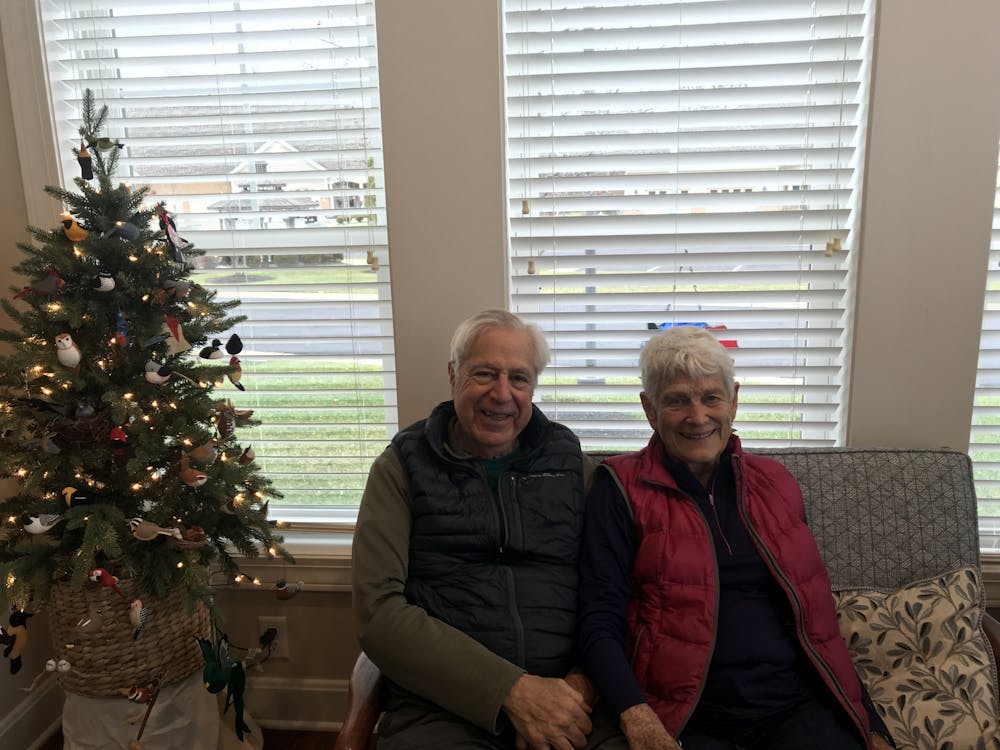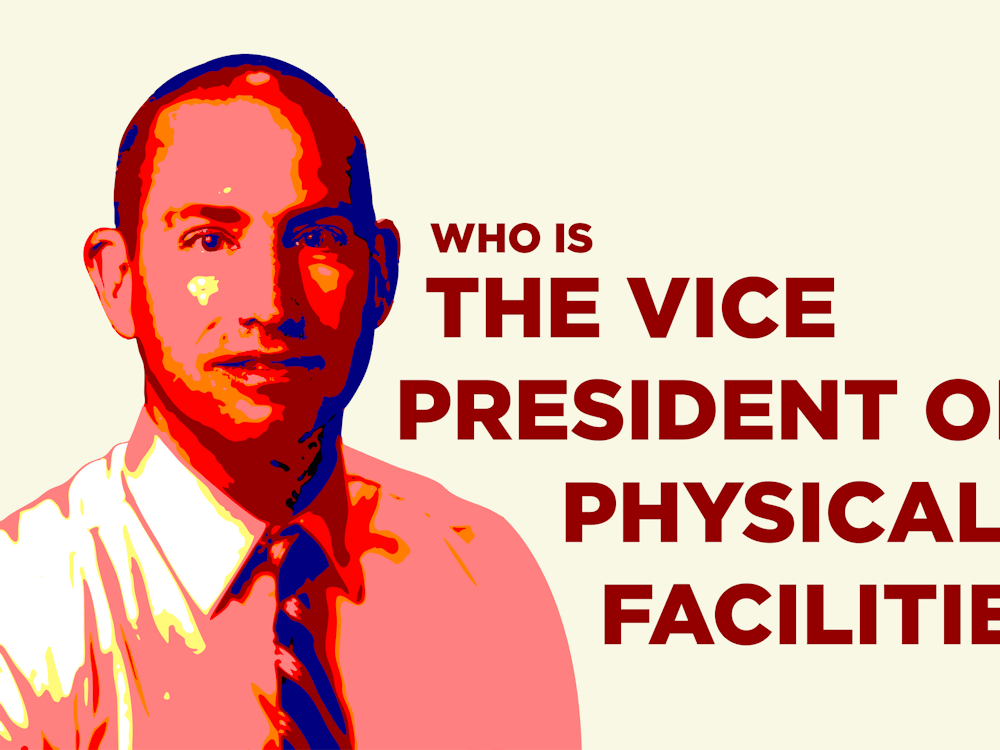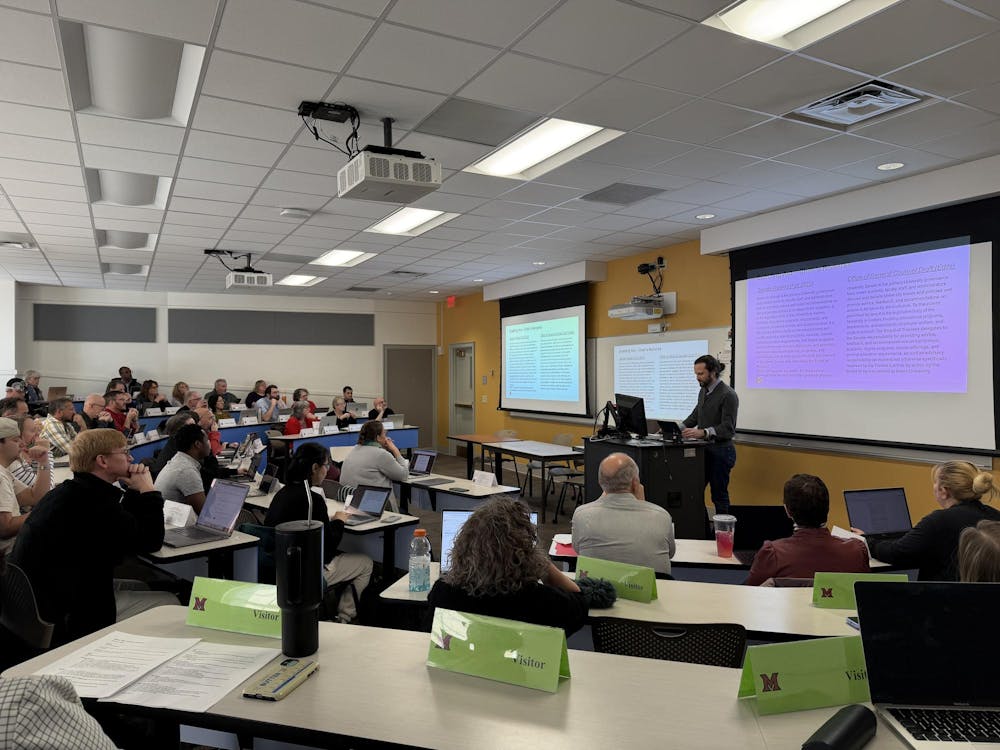Outside a little home on Whitetail Run in Oxford, Roxy, a golden retriever mix, waited patiently to greet her owners’ guests on a brisk-Sunday morning. Inside the single story house, Hardy Eshbaugh was cleaning up the dishes of the pancakes his wife, Barbara Eshbaugh, had made earlier that day. Although the couple had lived at the Knolls of Oxford Retirement Community for less than a year, every inch of the house was decorated with souvenirs from their travels, motifs of chili peppers and family photos.
The couple was used to a loud household. With four kids of their own, any extra space went to housing Miami University students and international students enrolled in local high schools. Now, the only noise that could be heard was Roxy, toy in mouth, begging someone to play with her.
Despite living in Oxford for over 50 years, the native East Coasters never thought they would end up in southwest Ohio.
“We were going to be here [for] two years,” Barbara said. “We’re not very good at math.”
When Hardy, who taught botany at Southern Illinois University, learned that he was wanted at Miami, the couple packed up all four children and headed for Ohio.
As Hardy became immersed in the botany department at Miami, the Eshbaughs decided to extend their two-year stay because Oxford was a good environment to raise their family.
“This community has a lot of support, and we’ll be taken care of as we step down, or age,” Barbara said.
“Or out,” Hardy laughed.
“Well, you have to joke about it,” Barbara said.
The couple, who recently celebrated their 65th wedding anniversary, met as undergraduates at a spring formal for Hardy’s fraternity. Hardy, a first-year student, took a girl from his English class, and his fraternity brother took Barbara. At the formal, Barbara’s date got sick, and Hardy’s date left early. In the dim lights of the bar, the couple sat on top of a pool table, talking for hours.
At the end of the night, Hardy turned to Barbara and said, “You’ll have to forgive me, I’m not very talkative.”
“Everybody who hears that just goes into hysterics,” Barbara said. “We can’t shut Hardy up.”
Enjoy what you're reading?
Signup for our newsletter
After his first-year at Cornell University, Hardy flunked chemistry, so he applied to the University of Vermont to take the course over the summer and transfer the credit. He stayed in touch with Barbara after the formal, and the university happened to be right across the lake from where she was a waitress.
“While she was slaving away as a waitress, I twiddled my thumbs until she was free, and we got to know each other,” Hardy said.
Barbara went on to attend Syracuse University, and during her junior year, she married Hardy, who was finishing up his senior year. Getting married as an undergraduate prompted Barbara to drop out of school, but she later returned to higher education.
Shortly after Hardy finished his undergraduate degree, he went to Indiana University to get his master’s and doctoral degrees, just barely finishing before serving in the Vietnam War. He was assigned to army artillery, but Wisconsin Senator William Proxmire pushed forward an issue that would allow individuals serving with advanced degrees to be interviewed to see if they were serving the U.S. in the way they should.
“And I said I wasn’t because I knew nothing about artillery,” Hardy said. “I knew about science.”
Hardy served in the Army Chemical Corps, moving Barbara with two children under the age of 4 and a third one due any day to Utah for nine months. After three weeks in Utah, he was sent to Alaska to collect mosquitos, which were shipped to a lab in Oklahoma and analyzed to determine the diseases they carried.
Hardy was always a scientist at heart, but his passion wasn’t with mosquitos; it was with plants. He became interested in botany while doing botanical projects in high school.
“One of which led me to the clinic because I got so ill from poison ivy,” Hardy laughed. “I do know how to tell poison ivy now.”
He originally thought he would become a high school teacher at a private school, but he fell in love with higher education. After coming to Miami in 1967, he taught a myriad of courses from tree-identification to anthropology, contemporary issues and ethnobotany plants. His favorite courses to teach, however, were international field studies in Nova Scotia, Newfoundland, the Amazon, Peru, Costa Rica and Uganda. Hardy even started a field course in the Bahamas that is still offered today where students study plant interactions on the island.
Barbara, who went back to school to get her degree in social work, took the field course to fulfill her science credit.
“I took my husband’s course in the Bahamas, and I slept with the professor and got a B,” Barbara laughed.

Hardy Eshbaugh, also known as "Dr. Pepper," photographed for The Miami Student in 1975 for his research on chili peppers.
Despite his enjoyment of the Bahamas, Hardy’s research is focused on chili peppers, earning him the nickname “Dr. Pepper.” He discovered a new type of pepper through his research, and a scientist in South Africa named the Capsicum eshbaughii pepper after him. His research with chili peppers took him all over the world including Mexico, Guatemala, Honduras, Costa Rica, Colombia, Ecuador, Peru and Bolivia.
Outside the research lab and exotic field trips, Hardy was more than a botany professor to many students. The Eshbaughs would house graduate students who needed a place to live, and Hardy maintained an open-door policy for students to feel comfortable sharing anything.
“You’re taught to be a teacher, you’re taught to teach at a university, you know you’re going to work with students, but you’re never taught that some of those students are going to depend on you for things that have nothing to do with your teaching,” Hardy said.
He retired as a professor emeritus in the botany department in 1998 but continued to teach until 2006.
In retirement, Hardy and Barbara still enjoy traveling, although they do much less. Their kids have moved out west to Arizona and Montana, and while they disapprove of their parents extensive traveling due to their age, the Eshbaughs are trying to plan their next trip to South Africa to visit Hardy’s sister.
“We’ve been pretty darn lucky with the way things have worked out for us,” Barbara said as she stood up to start cutting the squashes for their dinner.
“Hardy doesn’t like squash soup, but sometimes he just eats what I make him,” she joked, the faint glow of chili pepper lights lining the kitchen door frame behind her.
Hardy laughed too. The sound filled the quiet home of the East Coasters who moved to Oxford for two years, now going on 56.




